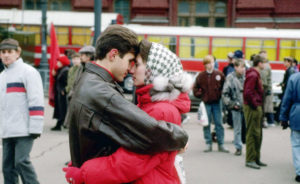Not long after the Trump election I was invited to a dinner party of the sort I’d only recently learned existed. Here’s how it goes. The host is wealthy, as are half the guests, and the other half are intellectuals there to provide entertainment. Waiters bring courses prepared by the chef in the kitchen while the host guides the conversation, calling upon the intellectuals to spit out little chestnuts of wisdom. After my first book came out, I found myself at a few of these, feeling a bit like a dancing bear as I said a few words on US military policy or veterans’ affairs before the host moved on to the next topic.
At this particular party, with guests still reeling from Trump’s victory, a professor at an Ivy League university began expounding on the flaws with American democracy — an outdated “18th-century technology” in our digital present. In a world of Russian Facebook ads and Cambridge Analytica, why put our faith in democratic processes? The winner gets the nuclear codes. Should we really leave it up to the manipulable US public? It’s nice giving everyone a vote, but so what? One individual’s vote among millions has little meaning. We need a better system, not sentimental ideas about the inherent value of voting.
Outdated 18th-century man that I am, I was outraged less by his arguments than by his underlying attitude, the blithe aristocratic assumption that democratic outcomes tell us nothing we need know, or nothing other than the hateful stupidity of American voters. That a better class of people should be in charge, the stakes being too high for such decisions to be left to the sorts of people… well… bringing our food in and our empty plates out of the dining room.
As Gordon Wood has noted, the American Revolution was not simply a matter of political change. It entailed a social revolution as well, emphasising equality as a social principle, undermining long-held hierarchies, and promoting an attitude of greater respect for ordinary men. Such attitudes are not always natural. The siren song of hierarchy, power, and authority captivates us even when we’re not recoiling from the monstrosities of populism. And if one would like to observe such attitudes at their most subtle and seductive, one of the best and most elegantly written books from such a perspective is George Kennan’s celebrated Sketches from a Life.
These are the assembled travel writings and letters written from 1927 to 1989 by George Kennan, diplomat and historian, key architect of Cold War containment and the Marshall Plan, a brilliant analyst and a beautiful writer, and an American patriot who long advocated for a less bellicose, less militarist, less hubristic foreign policy. ‘‘George Kennan came as close to authoring the diplomatic doctrine of his era as any diplomat in our history,’’ said Henry Kissinger. It’s a marvellous book, with passages of such elegance and insight I was constantly photographing them and sending them to friends. It also filled me with the same outrage I’d felt at that dinner party.
Those who have read Around the Cragged Hill, Kennan’s political and philosophical manifesto, will know some of the man’s oddities: his hatred of the automobile, his desire to split up America into 12 constituent republics, his belief that widespread use of domestic servants is essential for cultural health. And those familiar with the more unsavoury bits of his biography will know about his speculations that black and naturalised citizens should not be allowed to vote, about his self-declared “soft spot” for apartheid, about his State Department memo (that Dean Acheson refused to circulate) that partly blamed miscegenation for Latin America’s political troubles.
But it is in Sketches from a Life that we get his vision, most clearly and seductively, at the level of sensibility. And likewise, it is where we get almost unbidden notes of American optimism and egalitarianism occasionally polluting that vision. And so, rather than a sourcebook from “one of the wisest men in America” (as the New York Times put it when reviewing the book in 1989), this is a book best revisited as if it were a novel about a tragically limited, albeit brilliant, man who spent his life in service to a country whose spirit was at odds with his own.
Early on in Sketches, we learn that Kennan, 23 years old but already nostalgic for an imagined past, regrets not having been born 100 years earlier:
“Life is too full in these times to be comprehensible. We know too many cities to be able to grow into any of them, and our arrivals and departures are no longer matters for emotional debauches — they are too common. I should like to have lived in the days when a visit was a matter of months, when political and social problems were regarded from simple standpoints called ‘liberal’ and ‘conservative’, when foreign countries were still foreign, when a vast part of the world always bore the glamour of the great unknown, when there were still wars worth fighting and gods worth worshipping.”
“Such beautiful bullshit,” I wrote in the margins. Kennan was born in 1904, so one wonders which wars he was thinking of (America’s Indian Wars? 1824’s First Anglo-Burmese War? The French Conquest of Algeria?), but specificity here isn’t the thing so much as getting wrapped up in the myth-making power of your own prose.
Indeed, the book is haunted by visions of a perfect past where suffering was justified by higher ideals. In St. Petersburg he notes that the Imperial Yacht Club, once the haunt of dukes, diplomats, and dignitaries, had been turned into a state administration building for internal waterways. He laments the loss of an old playground for the rich: did it not “actually add something of colour and variety to the city for the people of that day to know that here, in these premises, there was being prepared, even if they didn’t eat it, some of the finest food eaten anywhere in northern Europe, that here things were being done elegantly, impressively, to the connoisseur’s taste?”
Monarchy gets a similar justification, since the trappings of monarchy are “the dream, the vision, the ideal of man as he might conceivably be — of man ennobled”, a theatre without which Europe supposedly couldn’t have produced “good taste”. Elsewhere he declares that men require “a moral order drawn up by those who are wiser and more experienced than the great masses of humanity and are capable of channelling into the body of spiritual law the ponderous experience of millennia of human progress”.
These beautiful visions of a refined world propped up by an impoverished populace are contrasted with Kennan’s disgusted reactions to widespread prosperity. In Scandinavia he sees, or thinks he sees, “the intellectual and spiritual vacuum which the European welfare state produces”. This happens when “the sacrifice of an attractive and gracious form of living on the part of a few is rationalised by the same arguments about better conditions for the many”. And in America, he speculates that when man is given “freedom both from political restraint and from want, the effect is to render him childlike”. In one of his more amusing asides, he compares California to “the popular American Protestant concept of heaven” since:
“There is always a reasonable flow of new arrivals; one meets many — not all — of one’s friends; people spend a good deal of their time congratulating each other over the fact that they are there; discontent would be unthinkable; and the newcomer is slightly disconcerted to realise that now — the devil having been banished and virtue being triumphant — nothing terribly interesting can ever happen again.”
There are some poignant moments, especially during and in the wake of Second World War, when he sees the faces of refugees, or the sites of mass slaughter. In the ruins of Hamburg, he’s struck by the conviction that no military calculus “could have justified this stupendous, careless destruction of civilian life and of material values”. On the border of Finland and Russia, he sketches a picture of birch trees growing above “the remains of some boy — be he Russian or Finnish — who gave up on this spot the privilege of leading a life through, like the rest of us, in all its satisfactions and disappointments”. This is the sensibility which spurred Kennan, in 1950, to write a State Department paper calling for an end to the use of nuclear weapons for offensive purposes, since they cannot be “reconciled with a political purpose directed to shaping, rather than destroying” adversaries, and since “they fail to take account of the ultimate responsibility of men for one another”.
Admirable, indeed. Grand suffering clearly moves him. And yet, here too, I find something disturbing. A true humanism would afford common people dignity in life as well as in death. But in Berlin, “the great awesome ruins” of East Berlin stand in judgment of West Berlin, which seems “toylike and trivial: an officious little busybody of a civilisation, fussy and impermanent”. And he cannot look upon a suffering child, a young French girl on a cart, in a torn and soiled dress, with all the youth gone out of her face, without projecting his own notions onto her: “Just try to tell her of liberalism and democracy, of progress, of ideals, of tradition, of romantic love, see how far you get… Do you think she’s going to come out of it a flaming little patriot? She saw the complete moral breakdown and degradation of her own people…”
There are times, though, where the aristocratic lens cracks, and rather than smug if elegantly written dismissals of human beings we get to witness a fine mind grappling with the gap between his perceptions and his ideas about the world. The earliest comes in Hamburg, in 1927, when he encounters a huge Communist demonstration at the Dammtor Station. “For all my contempt for the falseness and hatefulness and demagoguery of communism,” he writes, “I had a strange desire to cry when I first saw those ranks of people marching along the street — ill-dressed, slouching, brutalised people.” Kennan being Kennan, he finds them “ignorant, unpleasant people,” but can’t deny the truth of their humanity: “They were after centuries of mute despair, for the first time attempting to express and to assert themselves.”
Later, while Ambassador in Moscow, he leads into powerful reflections on the stability of the communist regime with a set of observations about the hundreds of thousands of garden plots on the outskirts of Moscow. These plots open up for ordinary Russians “a veritable world of what you might call ‘miniature private interest’, a world in which people devote themselves to, and think about, everything under the sun except the success of communism.” Political discontent doesn’t breed in these spaces so much as a “spiritual breach between the rulers and the ruled…”
Here, after so much nostalgia for the old European order, we see Kennan’s Americanness inflecting his vision. What he sees is not anti-communism so much as human life, unruly and unreconciled to ideological systems seeking its suppression. “The Party has tried to rule out change.” he writes, “but the Party is hoisted here on the petard of its own lack of a genuine democracy, of the loss of organic connection with the emotional forces of the people themselves.” Nothing dramatic looms on the horizon, no coming revolt, but the excitement of the revolution has exhausted itself. Human beings, never quite as mouldable as elites imagine, move unexpectedly, uncontrollably, dangerously.
I must confess, I have a certain degree of nostalgia for the world Kennan inhabited. Hard-earned expertise, like the expertise Kennan had about Russia, is not to be scoffed at, the gutting of the State Department over the past decades is one of the America’s great self-inflicted wounds, and a less hubristic, less militaristic foreign policy of the sort he advocated is one I heartily endorse. But though experts have valuable, if partial truths we need to hear, they should be haunted by the notion that those “ill-dressed, slouching, brutalised people” might have access to their own partial truths as well.
Disclaimer
Some of the posts we share are controversial and we do not necessarily agree with them in the whole extend. Sometimes we agree with the content or part of it but we do not agree with the narration or language. Nevertheless we find them somehow interesting, valuable and/or informative or we share them, because we strongly believe in freedom of speech, free press and journalism. We strongly encourage you to have a critical approach to all the content, do your own research and analysis to build your own opinion.
We would be glad to have your feedback.
Source: UnHerd Read the original article here: https://unherd.com/




